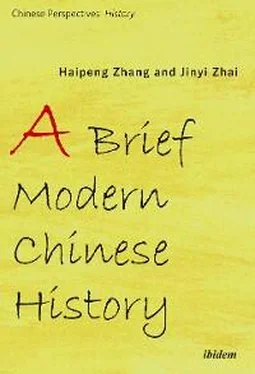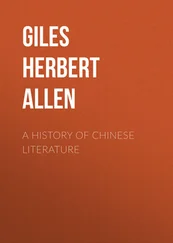15For Lin Zexu’s 林则徐 (1785–1850) memorandum to the throne, see: vol. 1 of Yapian zhan-zheng dang’an shiliao , p. 361.
16Lin Zexu, Lin Zexu quanji 林则徐全集 [Complete works of Lin Zexu] (Beijing: Zhonghua Book Company, 1959), p. 59.
17Fan Wenlan 范文澜, Zhongguo jindaishi 中国近代史 [The history of modern China] (Shanghai: SDX Joint Publishing Company, 1949; reprint, Shanghai: Shanghai Bookstore Publishing House, 1989), vol. 1, p. 19.
18Lin Zexu’s letter to Yao Chunmu 姚春木 and Wang Dongshou 王冬寿, in Dao Xian Tong Guang mingren shouzha 道咸同光名人手札 [A collection of personal letters of renowned people in the reigns of Daoguang, Xianfeng, Tongzhi and Guangxu (1821–1908)] (Taibei [Taipei]: Wen Hai Press Company, 1966), p. 14.
19Liang Qichao 梁启超, Zhongguo jin sanbainian xueshushi 中国近三百年学术史 [Chinese scholarship: A tricentennial history] (Wuhan: Chongwen Publishing Company, 2015), p. 273.
20Wei Yuan 魏源 (1794–1857), “Yuanxu 原叙” (Author’s preface), in vol. 1 of Haiguo tuzhi 海国图志 [Illustrated treatise on maritime kingdoms] (Changsha: Yuelu Press, 2005), p. 1.
21Ibid., pp. 1–15.
22Ibid., pp. 29–31.
23Ibid., p. 31.
24Ibid., p. 13, p. 18.
25Frederick Engels, “A New English Expedition to China”, in vol. 15 of Karl Marx and Frederick Engels: Collected Works (New York, NY: International Publishers, 1986), p. 243.
26Correspondence Relative to the Earl of Elgin’s Special Missions to China and Japan, 1857–1859 (London: Harrison and Sons, 1859), p. 56.
27Hosea Ballou Morse, The International Relations of the Chinese Empire (New York, NY: Paragon Book Gallery, 1910), vol. 1, p. 556.
28The Association of Chinese Historians and Qi Sihe 齐 思 和, eds., Yapian zhanzheng 鸦 片 战 争 [Collected primary sources: The Opium War] (Shanghai: Shenzhou guoguangshe, 1954), vol. 3, pp. 469–470.
29Yang Song 杨松, Deng Liqun 邓力群 and Rong Mengyuan 荣孟源, eds., Zhongguo jindaishi ziliao xuanji 中国近代史资料选辑 [Selected primary sources about the modern Chinese history] (Beijing: SDX Joint Publishing Company, 1954), pp. 115–116.
2. The Qing Government in Despair
The Taiping Rebellion and Its Socio-Political Experiments
The Taiping rebellion occurred at a time when Qing was facing an upsurge of peasant rebellions. The leader of the Taiping Rebellion was Hong Xiuquan 洪秀全 (1814–1864). Born into an ordinary family in Hua County, Guangdong, he devoted himself to studying the Confucian classics in the hope that he would pass the Imperial Examination and become a candidate for office. However, he did not perform well on the Imperial Examination and this made Hong bitter and resentful. He tried again in 1843 but failed again. He began to read the Christian book Good Words Exhorting the World (劝世良言), which spoke of monotheism and suggested people not worship any supernatural beings other than God. Convinced by these teachings, Hong, who was disillusioned with Confucianism, had himself baptized and became a Christian.
Later Feng Yunshan went to Guangxi, where he preached Hong-style Christianity. Zijingshan (Mount Zijing), the center of the Taiping Rebellion, was the center of Feng’s missionary work. He stayed in his hometown and worked as a teacher while also working on several treatises, expanding his religious ideas. In the spring of 1847, Hong visited Guangzhou at Issachar J. Roberts’ invitation. Roberts was a Baptist missionary from the American South. Believing that Hong did not know much about the Bible, Roberts would not baptize him. Hong then decided to leave for Zijingshan, a mountainous region renowned for its ethnic diversity.
As a result of Feng’s hard work, many local residents joined Hong’s church. In collaboration with Feng, Hong set up the God-Worshipping Society (拜上帝会) and recruited more than 2,000 members. Several prominent figures joined the following, such as Yang Xiuqing 杨秀清 (1821–1856) and Xiao Chaogui 萧朝贵. Yang was a poor farmer and charcoal-burner who lost his father at an early age. Hardship made Yang tough, unyielding and quick-witted. Xiao, a decisive and strong-minded man, lived a life similar to Yang’s and the two were like brothers.
In one of his treatises, Perceiving the Good and the Bad of the World (原道觉世训), which combined Confucian Great Harmony with some Christian doctrines, Hong said that the Great Peace would be fulfilled worldwide very soon and the Heavenly Kingdom would be created on earth. Hong’s teachings offered hope and power to people who were suffering. It was in this treatise that Hong explained that Yanluo (demons) were the chief enemy of God. Hong strongly condemned all types of Yanluo and even led his followers to destroy the image of Confucius. Hong’s God-Worshipping Society won the support of many of the poor working class. A senior general from the Taiping Army later recalled that Hong’s followers were usually from destitute families.
The God-Worshipping Society was strongly disliked by landlords and the local gentry. In 1847, Feng was taken into custody by a militia organization led by the wealthy. It was decided that he should be sent back to his hometown even though he did not do anything illegal. As a result, the stability of the God-Worshipping Society was threatened. However, in April, 1848, Yang declared that the Heavenly Father, or God, had come down to earth and, by doing so, had consolidated the God-Worshipping Society in Zijingshan. Half a year later, Xiao, one of Yang’s closest friends joined the society.
The God-Worshipping Society’s leadership was thus comprised of Hong, Feng, Yang and Xiao; the four became sworn brothers. They revered Jesus as their eldest brother. Later, Wei Changhui and Shi Dakai (1831–1863) joined them. They expanded their leadership, yet Hong took the lead. In the spring of 1850, Hong assumed an imperial yellow robe, usually the exclusive privilege of the emperor, and declared the beginning of Taiping Rebellion. Hong’s followers hailed him as the Heavenly King of Great Peace. 1The armed uprising formally started on November 4, 1850 in Jintian. 2Yang led the rebellion as the top military leader. Yang and Xiao, who were leading army advisers, issued an official proclamation, declaring God’s omniscience, omnipresence and omnipotence, 3and called for all righteous men to join the Taiping army. The rebellion was reported to the imperial court of Qing, which, in the winter, sent troops to put down the rebels. However, Qing was unaware of what a threat the rebellion would pose to the dynasty.
Thanks to Yang’s efforts, the number of Taiping soldiers grew to more than 20,000 by the end of 1850. Yang and Xiao saw themselves as leading a powerful and well-disciplined army and adopted their regulations from The Book of Rites of the Western Zhou (周 礼), one of the most important of the Confucian classics. The following January, the Taiping Army celebrated Hong’s thirty-eighth birthday in Jintian and then began to march eastward. Within half a year, the army grew from five brigades to ten. The rapid growth of the Taiping Army shocked the imperial court. Angry at the corruption and inefficiency of the Guangxi government, it had the political and military governors replaced with new ones. None other than the well-known Lin Zexu was sent to Guangxi to supervise the work of rehabilitating Qing’s armed forces. Unfortunately, Lin passed away en route . Another high-ranking governor was immediately sent to Guangxi. When he arrived, he soon realized that the Taiping rebels constituted a true threat to Qing. He, however, unexpectedly soon died of an illness. The government then asked an aristocrat to lead a united army to crack down on the Guangxi rebellion.
Читать дальше












